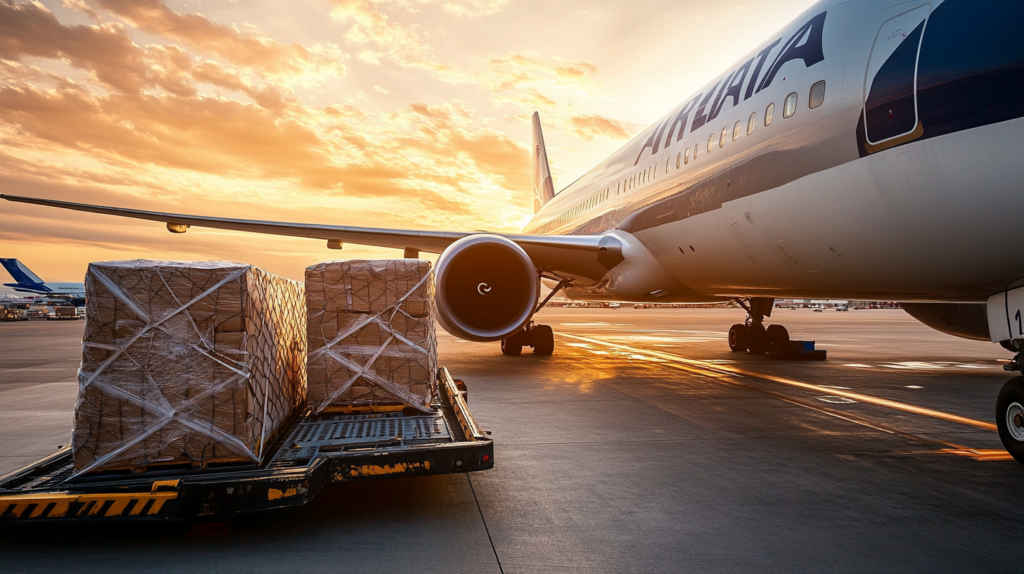
Freight News
Choosing the Best Way to Ship: Air Freight vs. Sea Freight

Transporting goods globally involves two primary options: air freight and sea freight. Each method has its advantages and disadvantages, and the right choice depends on your specific needs. In this article, we’ll compare air freight and sea freight, discussing their benefits, drawbacks, and ideal use cases. By the end, you should have a clearer understanding of which option is best for your business.
Understanding Air Freight
Air freight involves transporting goods by airplane. It’s a popular choice for businesses that need fast, efficient delivery.
Benefits of Air Freight
- Speed: Air freight is the fastest method of shipping. It can deliver goods across the globe in a matter of days, sometimes even hours.
- Reliability: Airlines have strict schedules and fewer delays compared to sea freight, making air freight more reliable.
- Security: Airports have tight security measures, reducing the risk of theft and damage.
Drawbacks of Air Freight
- Cost: Air freight is significantly more expensive than sea freight. The cost is calculated based on weight and volume, so heavy or bulky items can be very costly to ship by air.
- Environmental Impact: Airplanes produce a large amount of CO2, making air freight less environmentally friendly.
- Capacity Limitations: Airplanes have limited space, so they can’t handle very large shipments or oversized items.

Understanding Sea Freight
Sea freight involves transporting goods by ship. It’s a popular choice for businesses that need to move large quantities of goods over long distances.
Benefits of Sea Freight
- Cost-Effective: Sea freight is much cheaper than air freight, especially for large or heavy shipments.
- Capacity: Ships can carry a vast amount of cargo, making them ideal for large shipments.
- Environmental Impact: Ships are more fuel-efficient and produce less CO2 per ton of cargo compared to airplanes.
Drawbacks of Sea Freight
- Speed: Sea freight is much slower than air freight. Shipping can take several weeks or even months.
- Reliability: Ships are more susceptible to delays due to weather conditions, port congestion, and other factors.
- Security: While generally safe, sea freight can be more vulnerable to piracy and theft, especially in certain regions.
Comparing Costs: Air Freight vs. Sea Freight
When deciding between air freight and sea freight, cost is a significant factor. Let’s break down the cost considerations for each method.
Air Freight Costs
- Freight Charges: Calculated based on weight and volume. Costs can skyrocket for heavy or bulky items.
- Fuel Surcharges: Airlines often add fuel surcharges, especially when fuel prices are high.
- Security Fees: Enhanced security measures at airports can add to the costs.
Sea Freight Costs
- Freight Charges: Calculated based on container size (20-foot or 40-foot containers). More economical for large shipments.
- Port Fees: Charges for loading and unloading at ports.
- Customs Fees: Vary by country and can add to the overall cost.
Speed and Reliability
The speed and reliability of your chosen shipping method can significantly impact your business operations. Here’s a closer look at how air freight and sea freight compare in these areas.
Air Freight
- Speed: Typically delivers in 1-3 days for international shipments.
- Reliability: Less prone to delays, with strict schedules and frequent flights.
Sea Freight
- Speed: Takes several weeks to months for international shipments.
- Reliability: More prone to delays due to weather, port congestion, and other factors.
Capacity and Volume
The capacity and volume of your shipment are crucial factors when choosing between air freight and sea freight.
Air Freight
- Capacity: Limited by the size of the airplane. Not suitable for very large or bulky items.
- Volume: Best for smaller, high-value shipments.
Sea Freight
- Capacity: Ships can carry thousands of containers, making them ideal for large shipments.
- Volume: Best for large quantities of goods or oversized items.

Environmental Impact
With increasing awareness of environmental issues, the ecological footprint of your shipping method is an important consideration.
Air Freight
- CO2 Emissions: Airplanes produce a significant amount of CO2, making air freight less eco-friendly.
- Fuel Efficiency: Less fuel-efficient compared to ships.
Sea Freight
- CO2 Emissions: Ships produce less CO2 per ton of cargo.
- Fuel Efficiency: More fuel-efficient, making sea freight a greener option.
Ideal Use Cases
To help you decide which method is right for you, let’s look at some ideal use cases for air freight and sea freight.
Air Freight
- Urgent Shipments: When you need goods delivered quickly.
- High-Value Items: For expensive items where the cost of shipping is justified by the value of the goods.
- Perishable Goods: Items that need to be delivered quickly to avoid spoilage.
Sea Freight
- Large Shipments: When you need to move a large volume of goods.
- Heavy Items: For heavy items where air freight costs would be prohibitive.
- Non-Urgent Deliveries: When you have the luxury of time and can afford the longer transit.
Conclusion
Choosing between air freight and sea freight depends on your specific needs, including budget, speed, reliability, capacity, and environmental impact. Air freight is best for urgent, high-value, or perishable goods, while sea freight is ideal for large, heavy, or non-urgent shipments.
By understanding the benefits and drawbacks of each method, you can make an informed decision that aligns with your business goals and priorities.
Streamline Your Shipping with Express Freight Management
Ready to streamline your shipping logistics? Partner with Express Freight Management for efficient and tailored freight solutions. Whether you’re dealing with urgent air freight needs or large-volume sea shipments, our expert team will ensure your goods reach their destination on time and in optimal condition. Contact us today to discuss your unique requirements and discover how our services can support your business growth. Don’t let logistics stand in your way—let Express Freight Management be your trusted partner in navigating the complexities of global shipping.
